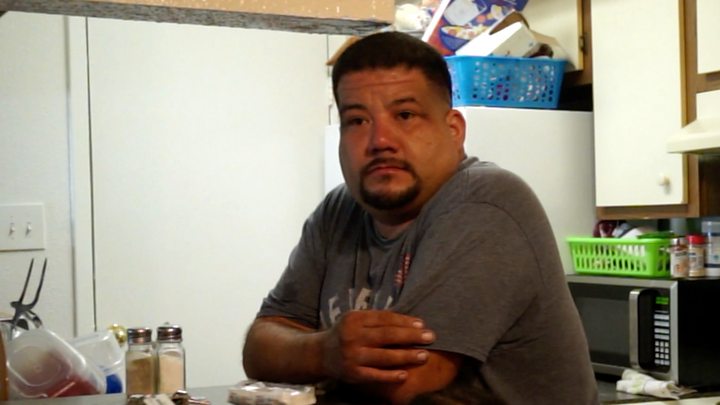Home » World News »
Why US is expecting an ‘avalanche’ of evictions
As hair salons, churches and restaurants reopen across the US, so are eviction courts. Advocates and experts say that an unprecedented crush of evictions is coming, threatening millions of Americans with homelessness as a possible second wave of the pandemic looms.
Sitting in her car parked outside of the little white house in Kansas City, Missouri, where she’d lived for two years, Tamika Cole was overwhelmed. She’d worked a long shift as a machine operator the night before, at a factory where she makes detergent bottles for $18 an hour. It’s good, stable work. Nevertheless, Cole was on the brink of losing her home. Her nerves were shot.
“What am I supposed to do?” she said. “I’m tired of crying.”
Cole said that she came home in early May to find an eviction notice affixed to her door. She believed that it was because of a dispute she had with her upstairs neighbour, but that her landlord never spoke to her about it before filing the eviction against her.
Due to the coronavirus, an eviction moratorium was in place in Kansas City, and Cole’s landlord couldn’t force her to move out right away. But she said that didn’t stop him from trying to make her as uncomfortable as possible, entering her apartment without her knowledge, cutting off her electricity, and unscrewing and removing a barred security door on her unit.
Now, due to the rapid reopening of Missouri and states like it all over the country, the moratorium was allowed to expire. The renter protections Cole had were gone and she was facing homelessness in the middle of the pandemic.
“I’ve been up all night,” she said. “I’m just trying to make it.”
In Kansas City, local courts declared a moratorium on evictions after a campaign by local tenants’ rights activists. Similar campaigns have had success nationally, and as the pandemic went into full swing in the US in mid-to-late March, most places halted eviction proceedings in some form – either on the state or local level – as both a means of shoring up newly out-of-work renters and as a precaution against the spread of coronavirus.
The federal CARES Act, which passed in early April, froze evictions for renters living in federally subsidised housing or in property backed by government loans.
Surveys estimated that in the month of May, nearly a third of renters failed to pay their landlords on time, and over half had lost jobs due to the crisis.
But as the country begins opening up again, moratoriums are ending and 40% of states no longer offer renters any protection. The CARES Act protections only apply to less than one-third of the country’s 108 million renters. Missouri is one of nine states in the US that never issued any type of statewide moratorium or stay on eviction proceedings, leaving it up to cities, counties and even individual courthouses to determine how to move forward. As temporary protections are falling away, like a patchwork quilt slowly fraying, hundreds of evictions are already under way in states like Missouri, Virginia and Texas.
That could be sending thousands to homeless shelters or to double up with family, at a time when coronavirus cases are still on the rise in many places.
“No court anywhere should be evicting anybody until at least the pandemic has sufficiently subsided,” said Eric Dunn, director of litigation for the National Housing Law Project. “Most people being evicted right now – it’s because their incomes have been disrupted during the crisis. Where are they supposed to go? It’s not like they have money to move somewhere else.”
According to newly released data from Princeton University’s Eviction Lab, one of the first places in the country to post worrisome eviction numbers is Milwaukee, Wisconsin – up 37% on last year. In Columbus, Ohio, eviction hearings are taking place in a convention centre in order to accommodate the number of cases and adhere to social distancing guidelines.
In North Carolina, a 9,000-case backlog is set to resume on 21 June.
Michigan’s State Court Administrative Office estimated when its moratorium comes to an end this month, 75,000 evictions will be filed.
In New York City alone, a coalition of advocates estimated that 50,000 evictions will be filed once Governor Andrew Cuomo’s statewide moratorium ends.
“Eviction was always too high in this country, but these are extreme numbers,” said Emily Benfer, a visiting professor of law at Columbia University and a former housing lawyer.
“The United States can expect an avalanche of evictions and it will negatively impact entire communities… We will be recovering from that for generations to come without federal intervention.”
A week after Kansas City officially opened up its courts, Tamika Cole was due to appear at 10:30am to make the case to a judge that she be allowed to stay. She had no lawyer, and only her own documentation, her own version of events and some advice she got from a tenants’ rights non-profit.
Cole said she suffers respiratory issues. The eviction courtrooms are on the seventh floor of a building that has only one consistently functioning elevator, and can hear hundreds of cases a day, making it unclear how effectively social distancing would be maintained.
But in order to keep a roof over her head, Cole didn’t have a choice – she had to go.
And once she did, she was almost certainly going to lose. A study of eviction court outcomes in Kansas City from 2006-2016 showed that over 99% eviction cases went against the tenant.
“What am I supposed to do?” Cole kept repeating. “There’s coronavirus. I can’t move into no shelter. I’m going to [have to] live in my car.”
Months before the global pandemic landed on US shores, Darquita Hoffman got behind on her bills and lost her car. Without transportation, she lost her job cleaning houses. Without an income, she lost her apartment.
After she spoke to the management at a Howard Johnson hotel in College Park, Georgia, she thought she’d found a solution. If Hoffman cleaned rooms for the hotel, she could get a discount on the weekly rent. She’d be employed and housed, paying $250 a week for a room with a double bed for her kids, and a cot pushed up against the wall for her.
“It’s a roof and I have a little bit of income coming in,” she recalled thinking.
But after five months of living in the hotel, as a tidal wave of coronavirus cases was sweeping across the nation, Hoffman’s feelings about the arrangement changed. She said that because she was paid by the room, not by the hour, her pay cheques mostly went back to the hotel. As tourism ground to a halt, there were fewer and fewer rooms to clean, and the cheques got even smaller. Hoffman became nervous about cleaning strangers’ rooms, and bringing the virus home to her six-year-old and 19-year-old daughters. So she put in her two weeks’ notice.
According to Hoffman, the hotel told her her rent would immediately go up to $350 a week, even before her two weeks were up, and that she owed them back rent for two weeks that she said she was told she didn’t have to pay. When she protested, she said the hotel started withholding her pay cheques altogether. She said they cut off power to her room for three days.
Then they started calling the police.
As evictions, both legal and illegal, ramp up in the United States they are likely to disproportionately impact a population that has already been devastated by the coronavirus – African Americans.
Before the pandemic, research showed that of the 2.3 million evictions that take place each year (about four per minute), they disproportionately impacted black families, particularly low-income, black women. In 17 states, black women are twice as likely to be evicted as white renters, according to statistics from the American Civil Liberties Union.
“The most common client we have is a black single mom,” said Erica Taylor, director of the Saturday Lawyer Program at the Atlanta Volunteer Lawyers Foundation, which provides free legal representation to indigent clients.
Atlanta is located in Fulton County, Georgia, which is about 45% black, and where there are 2,000 pending eviction cases. Eviction Lab’s previous research found that evictions were most prevalent in cities in the southeast region of the country, and in places where the population was 30% African American or higher.
Read more from Jessica
Georgia was one of the first states in the country to reopen its bars, restaurants, gyms and clubs, and allow gatherings of up to 50 people. At almost the same time that Governor Brian Kemp announced that the state would reopen, a Centers for Disease Control and Prevention study that took place in Georgia showed that more than four-fifths of hospitalised coronavirus patients were black.
“That’s our clients,” said Taylor. “They’re the most vulnerable.”
Devin Q Rutan, a researcher with Eviction Lab, said that even during normal times, an eviction can be the difference between a household maintaining stability and chaos.
“We know that evictions have really lasting damage for household finances and health. They precede job loss,” he said. “We’re pushing people out when it’s most dangerous, on top of that, in a pandemic. It’s already devastating the families to suffer an eviction to begin with.”
Many landlords and property managers will not even consider a tenant with a previous eviction on her record.
But going to court is not always how evictions play out, especially during coronavirus. Several advocates and experts that spoke to the BBC also reported seeing an uptick in “self-help” evictions, the colloquial name for illegal means that landlords can sometimes use to force their tenants to leave.
“People changing locks and shutting off utilities and resorting to threats,” explained Dunn. “Under pre-pandemic conditions it was not the rule, and now it just seems like those cases are routine.”
Not all informal evictions are done maliciously – some landlords work out a handshake agreement with tenants to move out and keep the eviction from appearing on the tenants’ record, which can badly impede their ability to rent elsewhere. But Taylor said her organisation is seeing more cases of landlords using aggressive, illegal tactics to bully renters out of the property, or conversely, proposing unconscionable deals that would allow a tenant to stay – like having sex with a landlord in exchange for rent.
“I thought I’d gotten to the point where I’d seen almost everything, but in this last period of time it has been absurd and ridiculous the kind of behaviour we’ve seen from landlords,” she said. “With them not being able to use the court system to do their dirty work, it’s brought out the worst in people.”
Luckily for Hoffman, when the College Park police responded to her room, the officers recognised that as a long-term renter at the hotel, Hoffman qualified under the eviction moratorium. They put her in touch with Taylor’s organisation, who is helping her stay for the time being and fight to get her wages back.
A man who identified himself as a manager at the hotel denied that they had intentionally cut off Hoffman’s power, but declined to comment further.
But Hoffman said she doesn’t trust the hotel not to throw her things out on the street while she’s gone. She rarely leaves the room now.
“I’ve been a praying woman,” she said, laughing gently. “Everybody’s like, ‘It’s good you’re staying strong,’ but I know it ain’t nothing but the grace of God that’s keeping me going. For real. I’m doing it for my kids. I have to get out of this situation.”
On the day of her hearing – a cold, rainy day in Kansas City – Tamika Cole got up a few hours after her shift at the factory ended and headed to the courthouse.
When she got there, the activist group KC Tenants was preparing to stage a “die-in” on the courthouse steps, beneath a statue of President Andrew Jackson on horseback. The activists hung a huge banner on Jackson’s pedestal, who – as America’s seventh president – signed the Indian Removal Act of 1830, which forced tens of thousands of Native Americans from their land and led to the “Trail of Tears”.
The banner read, “END EVICTIONS OR PEOPLE DIE”.
As Cole headed inside, the activists laid down – six feet apart – on the rain drenched concrete.
“Housing was the prescription [for coronavirus,]” said Tara Raghuveer, the director of KC Tenants. “People are going to be forced to put themselves at extraordinary health risk only to show up to court and get evicted.”
Gina Chiala, a lawyer for the Heartland Center for Jobs and Freedom, acknowledged that so far, the number of evictions being processed in Kansas City is still way down from an average year.
“I don’t think the full spike has hit. I think that’s still coming,” she said.
Even without a surge in cases, Chiala said she didn’t like what she had seen inside the courthouse – that the elevators and courtroom gallery were “troublingly crowded”. And she said she’d just recently had a client whose son worked in a factory with an outbreak, and had tested positive for the virus. Although she’d been exposed, Chiala still represented the woman.
“It’s not safe for tenants. It’s not safe for us. But I feel like we have to,” she said. “Hopefully nobody gets sick.”
When Cole emerged from court hours later, it was with mixed news – she’d been given a continuance, another week to bolster her case. But she was also unnerved by how friendly her landlord’s lawyer had been with the judge.
“He must have a lot of cases down there,” she said.
In order to address safety concerns, some courts in the US are offering “remote hearings” where tenants can appear by phone or even video. But advocates are split on their usefulness – it’s unclear whether tenants who can’t pay rent will have a high speed internet connection or even a working cell phone.
And advocates on all sides of the issue – both tenants and landlords – are desperate for some kind of solution that can stop cases from winding up in court in the first place.
“We would love an alternative to evicting someone, a way of getting a continued revenue stream and keeping that person housed will be a win-win for everyone,” said Jay Martin, executive director of Community Housing Improvement Program, which represents most small, independent landlords in New York City.
Martin said his organisation fears that as more people are unable to make rent, building owners will not be able to pay their property taxes, utility bills and mortgages, eventually leading to foreclosures and bank takeovers of multi-family housing units. The worst case scenario could look something like the foreclosure crisis of 2008, with massive impact on rental property owners rather than individual homeowners, and potential cascading effects on tenants.
He rejects an idea put forward by the tenant advocacy community that “cancel the rent” makes tenants safe, because the building itself could ultimately be bought out by a hedge fund or a bank, and tenants could lose all their rights to the building.
Benfer agreed that what is truly needed is a federal assistance package that would allow renters to remain in their homes but also makes sure that landlords and property owners also make the money they need to stay solvent. She points to the HEROES Act, which has passed the House and includes $100 billion in emergency rental assistance. The $3 trillion package has been stalled in the Senate for weeks, where Republicans have control.
“At the end of the day, the rent, the housing market is really a keystone to our communities. When the rent isn’t paid, property taxes aren’t paid, mortgages aren’t paid, maintenance employees aren’t paid,” she said. “All of that has ripple effects into these communities. It affects our education system, it affects basic necessities in the community. Once that link is broken we see this chain reaction.
“Renters aren’t the only ones who will suffer.”
The night before her final hearing in Kansas City court, Tamika Cole sounded exhausted while on break at work, the sound of equipment whirring and clattering behind her.
“I don’t have no strategy. I don’t know what I’m fighting for. I have my receipts. I have the pictures and little videos,” she said. “I really don’t even care. I’m just praying this judge will buy me a little time so I can find some place to go.”
Cole actually had lined up another place to move to, but it wasn’t going to be ready until 15 June. That still left her with about 10 days without a place to stay, or anywhere to store her possessions. Even though she has family in town, Cole said she doesn’t want to put herself or her family at risk of contracting Covid-19.
“Half of your family don’t even want you to be there, because they don’t know who’s sick or not,” she said.
On 4 June, Cole returned to the courthouse once again. When she walked back out, she sounded like a completely different person.
“It’s just over,” she sighed. “It’s not going to be on my record.”
Cole said that a tenant’s rights advocate – she wasn’t sure from where – was in the courtroom and heard her story. The advocate advised that Cole approach her landlord’s lawyer directly and explain that she was willing to move out and pay back rent if she could just get an extra ten days to move out. According to Cole, the landlord reluctantly agreed.
It was a moment of total relief, a break in the clouds.
“That’s all I wanted was a little time to go on and move,” she said. “I’m happy.”I
lllustrations by Emma Lynch
.
Source: Read Full Article









